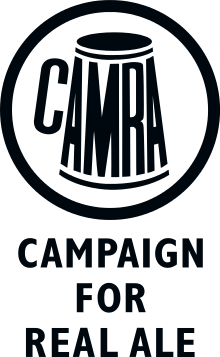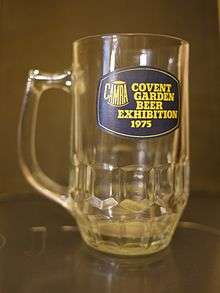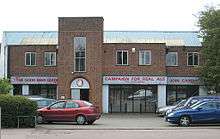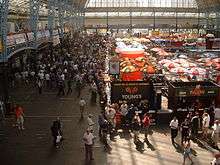Campaign for Real Ale
The Campaign for Real Ale (CAMRA) is an independent voluntary consumer organisation headquartered in St Albans, England, which promotes real ale, real cider, real perry and traditional British pubs and clubs. With nearly 185,000 members, it is now the largest single-issue consumer group in the UK,[1] and is a founding member of the European Beer Consumers Union (EBCU).
 Logo of CAMRA | |
| Formation | 1971 |
|---|---|
| Type | Consumer organisation |
| Headquarters | St Albans |
| Location | |
Membership | 184,849 (as of 5 August 2020) |
Official language | English |
National Chairman / Chief Executive | Nik Antona / Tom Stainer |
| Website | www.camra.org.uk |
History

The organisation was founded on 16 March 1971 in Kruger's bar in Dunquin, Kerry, Ireland[2][3] by Michael Hardman, Graham Lees, Jim Makin, and Bill Mellor, who were opposed to the growing mass production of beer and the homogenisation of the British brewing industry. The original name was the Campaign for the Revitalisation of Ale.[4] Following the formation of the Campaign, the first annual general meeting took place in 1972, at the Rose Inn in Coton Road, Nuneaton. Early membership consisted of the four founders and their friends. Interest in CAMRA and its objectives spread rapidly, with 5,000 members signed up by 1973. Other early influential members included Christopher Hutt, author of Death of the English Pub, who succeeded Hardman as chairman, Frank Baillie, author of The Beer Drinker's Companion, and later the many times Good Beer Guide editor, Roger Protz.
In the 1980s, CAMRA was influential in campaigning against the "Big Six" breweries who had a stranglehold on the UK's pubs. This resulted in The Supply of Beer (Tied Estate) Order 1989, more commonly known as the Beer Orders. The orders limited the number of pubs that a brewery could own but an unintended consequence was that many breweries ceased producing beer to focus solely on being pub-owning businesses or PubCos. In the late 1980s, CAMRA added cider campaigning to its remit with the creation of APPLE.
In 1991, CAMRA reached 30,000 members across the UK and abroad and, a year later, helped to launch the European Beer Consumers Union. CAMRA remains EBCU's largest contributor, despite the UK's exit from the European Union.
On 31 March 2016, founder Michael Hardman returned to chair a Revitalisation Project Steering Group. The aim of the Revitalisation Project was to review the organisation's purpose and future direction. Consultation meetings took place in the spring and summer of 2016,[5] and further discussion took place at the Bournemouth AGM and Conference in spring 2017 leading to possible refinement of proposals then subject to a final vote of all members at spring 2018's AGM and Conference. At that 2018 meeting, all but one of the proposed special resolutions were passed by voting, which all members could participate in. The failed special resolution related to a proposal for the Campaign to act as the voice and represent the interests of all pub-goers and beer, cider and perry drinkers.
Aims
CAMRA's stated aims are:
- To secure the long-term future of real ale, real cider and real perry by increasing their quality, availability and popularity
- To promote and protect pubs and clubs as social centres as part of the UK's cultural heritage
- To increase recognition of the benefits of responsible, moderate social drinking
- To play a leading role in the provision of information, education and training to all those with an interest in beer, cider and perry of any type
- To ensure, where possible, that producers and retailers of beer, cider and perry act in the best interests of the customer.[6]
CAMRA's campaigns include promoting small brewing and pub businesses, reforming licensing laws, reducing tax on beer, and stopping continued consolidation among local British brewers.[7] It also makes an effort to promote less common varieties of beer, including stout, porter, and mild,[8] as well as traditional cider and perry.[9]
CAMRA's states that real ale can only be served without the use of additional carbonation. This means that "any beer brand which is produced in both cask and keg versions" is not admitted to CAMRA festivals if the brewery's marketing is deemed to imply an equivalence of quality or character between the two versions.[10]
Organisation

CAMRA is organised on a federal basis, over 200 local branches, each covering a particular geographical area of the UK, that contribute to the central body of the organisation based in St Albans. It is governed by a National Executive, made up of 12 voluntary unpaid directors elected by the membership.[11] The local branches are grouped into 16 regions across the UK, such as the West Midlands or Wessex.[12]
| Director | Position |
|---|---|
| Nik Antona | National Chairman |
| Abi Newton | National Vice-Chairman and People Director |
| Ian Garner | Finance Director |
| Nick Boley | Campaigns Director |
| Gillian Hough | Real Ale, Cider and Perry Campaigns Director |
| Ben Wilkinson | Pubs and Clubs Campaigns Director |
| Catherine Tonry | Events Director |
| Gary Timmins | Awards Director |
| Ash Corbett-Collins | Commercial & Communications Director |
| Jonathan Kemp | Director |
| Hubert Gieschen | Director |
| Sarah Crawford | Director |
In 2009, CAMRA announced that it had reached the 100,000 members mark and subsequently went on to pass the 150,000 members mark in 2013.[13] Member benefits include a monthly newspaper, What's Brewing and a quarterly BEER magazine, and free or reduced price admission to CAMRA-organised beer festivals. In recent times CAMRA has obtained benefits for its members from some commercial organisations and increasingly some licensed premises offer members price reductions on real ale (and sometimes cider and perry).
Publications and websites
CAMRA publishes the Good Beer Guide, an annually compiled directory of the best 4,500 real ale outlets and listing of real ale brewers. CAMRA members receive a monthly newspaper called What's Brewing and a quarterly colour magazine called Beer. In 2013 CAMRA launched public access to a national pub database, WhatPub. This database is maintained by local volunteers, covering all pubs in the UK and listing information such as opening times, location and beers available. It also maintains a National Inventory of Historic Pub Interiors to help bring greater recognition and protection to Britain's most historic pubs.
Festivals

CAMRA supports and promotes beer and cider festivals around the country, which are organised by local CAMRA branches. Generally, each festival charges an entry fee which either covers entry only or also includes a commemorative glass showing the details of the festival. A festival programme is usually also provided, with a list and description of the drinks available.[14] Members may get discounted entrance to CAMRA festivals.
The Campaign also organises the annual Great British Beer Festival in August. It is now held in the Great, National & West Halls at the Olympia Exhibition Centre, in Kensington, London, having been held for a few years at Earl's Court as well as regionally in the past at venues such as Brighton and Leeds. This is the UK's largest beer festival, with over 900 beers, ciders and perries available over the week long event.
For many years, CAMRA also organised the National Winter Ales Festival. However, in 2017 this was re-branded as the Great British Beer Festival Winter. Unlike the Great British Beer Festival, the Winter event does not have a permanent venue and is rotated throughout the country every three years. Recent hosts have been Derby and Norwich, with the event currently held each February in Birmingham. In 2020 CAMRA also launched the Great Welsh Beer Festival, to be held in Cardiff in April.
Awards
CAMRA presents awards for beers and pubs, such as the National Pub of the Year. The competition begins in the preceding year with branches choosing their local pub of the year through either a ballot or a panel of judges. The branch winners are entered into 16 regional competitions which are then visited by several individuals who agree the best using a scoring system that looks at beer quality, aesthetic, and welcome. The four finalists are announced each year before a ceremony to crown the winner in the spring.[15] There are also the Pub Design Awards, which are held in association with English Heritage and the Victorian Society. These comprise several categories, including new build, refurbished and converted pubs.
The best known CAMRA award is the Champion Beer of Britain,[16] which is selected at the Great British Beer Festival. Other awards include the Champion Beer of Scotland and the Champion Beer of Wales.
National Beer Scoring Scheme
CAMRA developed the National Beer Scoring Scheme[17] (NBSS) as an easy to use scheme for judging beer quality in pubs, to assist CAMRA branches in selecting pubs for the Good Beer Guide. CAMRA members input their beer scores online via WhatPub or through the Good Beer Guide app.
Pub Heritage
The CAMRA Pub Heritage Group identifies, records and helps to protect pub interiors of historic and/or architectural importance, and seeks to get them listed.[18]
The group maintains two inventories of Heritage pubs, the National Inventory (NI), which contains only those pubs that have been maintained in their original condition (or have been modified very little) for at least thirty years, but usually since at least World War II. The second, larger, inventory is the Regional Inventory (RI), which is broken down by county and contains both those pubs listed in the NI and other pubs that are not eligible for the NI, for reasons such as having been overly modified, but are still considered historically important, or have particular architectural value.
The NI contains 289 pubs as of June 2009.[19]
LocAle
The LocAle scheme was launched in 2007[20][21][22] to promote locally brewed beers. The scheme functions slightly differently in each area, and is managed by each branch, but each is similar: if the beer is to be promoted as a LocAle it must come from a brewery within a predetermined number of miles set by each CAMRA branch, generally around 20,[23] although the North London branch has set it at 30 miles[24] from brewery to pub,[21] even if it comes from a distribution centre further away;[23] in addition, each participating pub must keep at least one LocAle for sale at all times.[23][24]
Investment club
Note that the CAMRA Members' Investment Club is not in any way part of CAMRA Ltd. CAMRA members may join the CAMRA Members' Investment Club which, since 1989, has invested in real ale breweries and pub chains,[25] although all investors must be CAMRA members.[26]
See also
References
- England My England: A Treasury of All Things English. Pavilion Books. 2005. ISBN 978-1-86105-893-5.
- "Key Events in CAMRA's History". Archived from the original on 19 September 2012. Retrieved 25 July 2013.
- Low, Harry (31 March 2016). "Should there be a crusade to save British pubs?". BBC News. Retrieved 31 March 2016.
- Neill, Richard (9 November 2000). "Still bitter after all these years". The Telegraph. London. Retrieved 17 July 2009.
- "CAMRA's Revitalisation Project Events – CAMRA". CAMRA. Retrieved 25 April 2016.
- "Archived copy". Archived from the original on 15 June 2018. Retrieved 15 June 2018.CS1 maint: archived copy as title (link)
- "Campaigns – CAMRA". Retrieved 26 October 2011.
- "Different Styles". Archived from the original on 29 July 2013. Retrieved 25 July 2013.
- "About Cider – CAMRA". Archived from the original on 22 January 2012. Retrieved 26 October 2011.
- "Cromarty, CAMRA and crazy cask cancellation". I might have a glass of beer. 15 March 2013.
- "What is CAMRA?". CAMRA. Archived from the original on 10 January 2011. Retrieved 27 October 2011.
- "CAMRA Near You". CAMRA. Retrieved 26 October 2011.
- What is CAMRA?, CAMRA, 4 April 2012, archived from the original on 6 April 2012, retrieved 4 April 2012
- "List of upcoming CAMRA beer festivals". Archived from the original on 29 July 2013. Retrieved 25 July 2013.
- morningadvertiser.co.uk. "250-year-old family gem wins CAMRA's pub of the year". morningadvertiser.co.uk. Retrieved 3 March 2020.
- Champion Beer of Britain, Campaign for Real Ale, retrieved 25 July 2013
- Laniosh, Brett (12 January 2006). "National Beer Scoring Scheme". Campaign for Real Ale. Retrieved 25 July 2013.
- Heritage Pubs – An Overview, Campaign for Real Ale, retrieved 5 May 2009
- "Pub Heritage, the Campaign for Real Ale". heritagepubs.org.uk. Archived from the original on 29 June 2009. Retrieved 17 July 2009.
- 'Check your beers urges LocAle creator', What's Brewing, August 2010 issue
- 'LocAle boosts local tourism', What's Brewing, September 2010 issue
- CAMRA LocAle (accessed 25 July 2013)
- LocAle – More Information & Downloads for Licensees Archived 22 September 2013 at the Wayback Machine (accessed 25 July 2013)
- CAMRA North London – LocAle (accessed 6 September 2010)
- "Company Information". Companies House. Retrieved 18 December 2017.
- "Club rules". CAMRA Member Investment Club. Retrieved 18 December 2017.